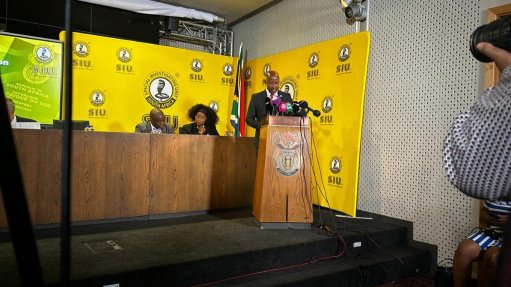Plastics SA calls for a plastics-free environment
Industry body Plastics South Africa (SA), during Plastic Free July, is advocating for a science-based, complementary strategy to eradicate unnecessary plastic and consider the overall environmental impact of various plastic alternatives.
“We don’t endorse the call for people to go plastic free, but we support the appeal for a plastics-free environment,” says Plastics SA executive director Anton Hanekom.
A 2020 study conducted by the Council for Scientific and Industrial Research found that locally produced plastic shopping bags have the lowest environmental footprint compared with carrier bags made from alternative or biodegradable materials, provided that the plastic bags are re-used, he points out.
“Plastics are essential to achieving a low-carbon future and the United Nations' Sustainable Development Goals. Through the use of plastics, cars are being light-weighted and buildings insulated, reducing energy use and greenhouse-gas emissions.
“Some of society’s biggest challenges are being addressed with the help of plastics, including improving medical outcomes, access to fresh and healthy foods, hygiene and sanitation, modern communication, transportation systems, infrastructure and employment,” says Hanekom.
However, the benefits of plastics are jeopardised if plastic waste pollutes the environment, he adds.
“The real issue that should be addressed is not the use of plastics, but human behaviour and the country’s broken waste collection and recycling systems. A few days ago, Statistics South Africa (Stats SA) released its General Household Survey for 2021, indicating that no improvement has been made with regard to waste collection in South Africa.
“Stats SA's report showed that 35% of households in South Africa still have to rely on communal or household refuse dumps, while 1.6 % of households have no facilities at all. The reality is that, if we do not fix this broken waste management system, all our other efforts will be less effective and even wasteful and fruitless activities,” Hanekom says.
Even with the best redesigned product that is 100% recyclable, if it is not separated at household level and moved to a central place where it can be sorted for recycling then, with the current broken system, it will end up in a landfill or the environment, Plastics SA points out.
“We need to stop cherry-picking and collect all waste to combat pollution. Every piece of plastic has value and has the potential to be repurposed and recycled into something new,” Hanekom says.
Plastics SA and its members will continue to make a tangible difference through various clean-up operations and initiatives that help to keep South Africa's river catchment areas clean of plastic waste.
The organisation and its members work in close partnership with all relevant stakeholders, including various levels of government, producer responsibility organisations and educators to focus on improving waste management and recycling, offering ongoing education, training and awareness in communities around the country.
One such example is the Inkwazi Isu, or Fish Eagle, project, which was launched along the KwaZulu-Natal South Coast after flash floods washed up tonnes of plastic litter onto beaches, Hanekom says.
Further, Plastics SA will coordinate its yearly Clean-Up & Recycle SA Week from September 12 to 17, which culminates in River Clean-up Day on September 14, National Recycling Day on September 16, and the World Clean-Up Day / International Coastal Clean-Up Day on September 17.
“Plastics give us reliable performance at an affordable price. There are many applications of plastics in the healthcare environment, automotive industry, technology, building and construction and mining.
“More of the plastics used in these sectors are either recyclable, or are being manufactured with a percentage of recycled plastic contents as product designers and developers are grasping the benefits and savings afforded to them by supporting the circular economy,” he says.
Article Enquiry
Email Article
Save Article
Feedback
To advertise email advertising@creamermedia.co.za or click here
Announcements
What's On
Subscribe to improve your user experience...
Option 1 (equivalent of R125 a month):
Receive a weekly copy of Creamer Media's Engineering News & Mining Weekly magazine
(print copy for those in South Africa and e-magazine for those outside of South Africa)
Receive daily email newsletters
Access to full search results
Access archive of magazine back copies
Access to Projects in Progress
Access to ONE Research Report of your choice in PDF format
Option 2 (equivalent of R375 a month):
All benefits from Option 1
PLUS
Access to Creamer Media's Research Channel Africa for ALL Research Reports, in PDF format, on various industrial and mining sectors
including Electricity; Water; Energy Transition; Hydrogen; Roads, Rail and Ports; Coal; Gold; Platinum; Battery Metals; etc.
Already a subscriber?
Forgotten your password?
Receive weekly copy of Creamer Media's Engineering News & Mining Weekly magazine (print copy for those in South Africa and e-magazine for those outside of South Africa)
➕
Recieve daily email newsletters
➕
Access to full search results
➕
Access archive of magazine back copies
➕
Access to Projects in Progress
➕
Access to ONE Research Report of your choice in PDF format
RESEARCH CHANNEL AFRICA
R4500 (equivalent of R375 a month)
SUBSCRIBEAll benefits from Option 1
➕
Access to Creamer Media's Research Channel Africa for ALL Research Reports on various industrial and mining sectors, in PDF format, including on:
Electricity
➕
Water
➕
Energy Transition
➕
Hydrogen
➕
Roads, Rail and Ports
➕
Coal
➕
Gold
➕
Platinum
➕
Battery Metals
➕
etc.
Receive all benefits from Option 1 or Option 2 delivered to numerous people at your company
➕
Multiple User names and Passwords for simultaneous log-ins
➕
Intranet integration access to all in your organisation


















